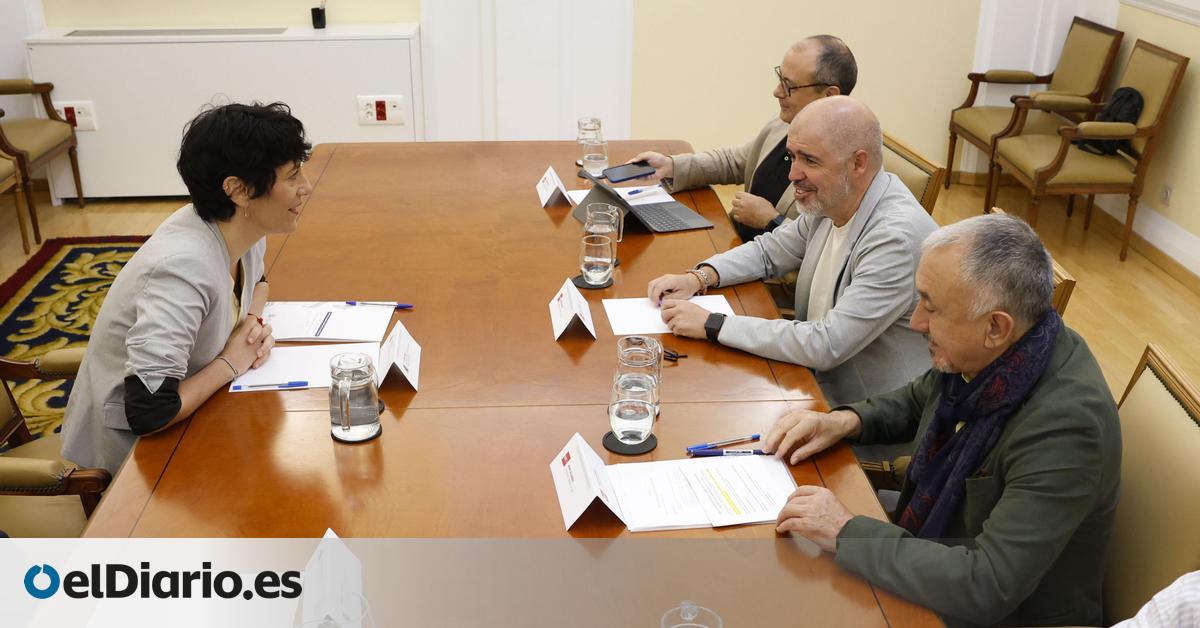
A year after the signing of the latest pension agreement, an issue that then went unnoticed continues to place. If the unions initiated the last political course by signing a tripartite agreement with the president of the Government and the employer, in this exercise they have put on the table of the Ministry of Social Security the brake that supposed for dozens of public employees, whose right to partial retirement was blocked by the requirements that the new regulations put for the incorporation of the reliefs.
Minister Elma Saiz met this Thursday with the general secretaries of CCOO and UGT, Unai Sordo and Pepe Álvarez, respectively, to address the social dialogue agenda of the next course. In this meeting, the union representatives urged the Government to correct some “elements” that remained in the air with the reform, which has left in limbo to the labor personnel who had the partial retirement collected in their agreements and that could opt for this modality, which allows to compatible during the last years of their work life and pension.
The new regulations require that the reliefs are incorporated with indefinite contracts already full time. Something possible in the private sector, but impossible in the administration without a public employment call that offers the guarantees of equality, merit and capacity. Until April 1, when this part of the reform came into force, the labor personnel of public agencies and companies could give relief to another worker, temporarily hired.
To try to alleviate the mess, the Ministry of Public Function implemented an additional replacement rate. The objective was to “guarantee the partial retirement of public sector labor” and that this “does not lose that right.” The solution was to enable the possibility of convening extraordinary offers of public employment, in charge of each administration or entity. The Ministry that Oscar López directs was the first to announce one, of 1,000 places, for those public workers with the right to benefit from this withdrawal modality between April 1, 2025 and July 1, 2026.
In practice, the materialization of that offer is not immediate. It was announced in June and is still in process, within the normal deadlines. But a worker who met the requirements and would like to take advantage of this modality on April 1, would have already lost four months. The unions have transferred to Minister Saiz the need to stop the “paralysis” of many public administrations when activating these processes. Specifically, Sordo said they have put “an approach to resolve this in the coming weeks.”
This approach that the trade union organizations have led to the Government would go to incorporate an exception in the current regulation that gave public administrations a reasonable margin to incorporate the reliever, once the public employee had already passed to the situation of early retirement. This would allow workers who are now waiting for their relay, to benefit from this withdrawal modality before the incorporation occurs.
Ministerial sources indicate that this is an issue that will continue to be talking at the social dialogue table. Precisely, although without mentioning this specific conflict, Saiz defended at the end of the meeting that social dialogue is “a fundamental tool.” “We still have a lot of margin to grow, to advance social rights, to improve the lives of citizenship,” he said.
Trade union organizations are also aware of the government’s commitment to recover partial retirement for all officials, which the popular Mariano Rajoy eliminated in one of the 2012 cuts batter It is the implementation of the early retirement, but also the implementation of the 35 hours per week, the salary improvement, the unlocking of the Public Function Law or the end of the replacement rate.
Source: www.eldiario.es

